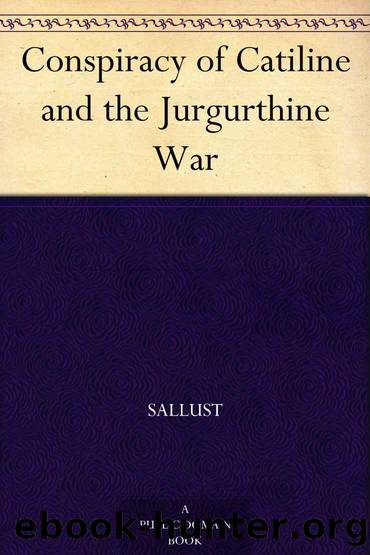Conspiracy of Catiline and the Jurgurthine War by Sallust

Author:Sallust [Sallust]
Language: eng
Format: epub
Tags: Rome -- History -- Conspiracy of Catiline, 65-62 B.C., Jugurthine War, 111-105 B.C.
Published: 2012-05-12T04:00:00+00:00
NOTES FOR THE JUGURTHINE WAR
[1] I. Intellectual powerâVirtute. See the remarks on virtus, at the commencement of the Conspiracy of Catiline. A little below, I have rendered via virtutis, "the path of true merit."
[2] Worthy of honorâClarus. "A person may be called clarus either on account of his great actions and merits; or on account of some honor which he has obtained, as the consuls were called clarissimi viri; or on account of great expectations which are formed from him. But since the worth of him who is clarus is known by all, it appears that the mind is here called clarus because its nature is such that preeminence is generally attributed to it, and the attention of all directed toward it." Dietsch.
[3] Abandons itselfâPessum datus est. Is altogether sunk and overwhelmed.
[4] Impute their delinquency to circumstances, etc.âSuam quisque culpam ad negotia transferunt. Men excuse their indolence and inactivity, by saying that the weakness of their faculties, or the circumstances in which they are placed, render them unable to accomplish any thing of importance. But, says Seneca, Satis natura, homini dedit roboris, si illo utamur;ânolle in causâ, non posse praetenditur. "Nature has given men sufficient powers, if they will but use them; but they pretend that they can not when the truth is that they will not." "Negotia is a common word with Sallust, for which other writers would use res, facta." Gerlach. "Cajus rei nos ipsi sumus auctores, ejus culpam rebus externis attribuimus." Muller. "Auctores" is the same as the [Greek: aitioi].
[5] UselessâAliena. Unsuitable, not to the purpose, not contributing to the improvement of life.
[6] Instead of being mortalâPro mortalibus. There are two senses in which these words may be taken: as far as mortals can, and instead of being mortals. Kritz and Dietsch say that the latter is undoubtedly the true sense. Other commentators are either silent or say little to the purpose. As for the translators, they have studied only how to get over the passage delicately. The latter sense is perhaps favored by what is said in c. 2, that "the illustrious achievements of the mind are, like the mind itself, immortal."
[7] II. They all rise and fall, etc.âOmnia orta occidunt, et aucta senescunt. This is true of things in general, but is here spoken only of the qualities of the body, as De Brosses clearly perceived.
[8] Has power over all thingsâHabet cuncta. "All things are in its power." Dietsch. "Sub ditione tenet. So Jupiter, Ov. Met. i. 197: Quum mihi qui fulmen, qui vos habeoque regoque." Burnouf. So Aristippus said, Habeo Laidem, non habeor a Laide, [Greek: echo ouk echomai]. Cic. Epist. ad Fam. ix. 26.
[9] III. Civil and military officesâMagistratus et imperia. "Illo vocabule civilia, hoc militaria munera, significantur." Dietsch.
[10] To rule our country or subjects, etc.âNam vi quidem regere patriam aut parentes, etc. Cortius, Gerlach, Kritz, Dietsch, and Muller are unanimous in understanding parentes as the participle of the verb pareo. That this is the sense, says Gerlach, is sufficiently proved by the
Download
This site does not store any files on its server. We only index and link to content provided by other sites. Please contact the content providers to delete copyright contents if any and email us, we'll remove relevant links or contents immediately.
Spare by Prince Harry The Duke of Sussex(5197)
Navigation and Map Reading by K Andrew(5156)
Tuesdays with Morrie by Mitch Albom(4784)
Machine Learning at Scale with H2O by Gregory Keys | David Whiting(4313)
Cracking the GRE Premium Edition with 6 Practice Tests, 2015 (Graduate School Test Preparation) by Princeton Review(4293)
Never by Ken Follett(3957)
Goodbye Paradise(3810)
What It Really Takes to Get Into Ivy League and Other Highly Selective Colleges by Hughes Chuck(3760)
Fairy Tale by Stephen King(3399)
Harry Potter and the Prisoner of Azkaban (Book 3) by J. K. Rowling(3360)
Pledged by Alexandra Robbins(3178)
Kick Ass in College: Highest Rated "How to Study in College" Book | 77 Ninja Study Skills Tips and Career Strategies | Motivational for College Students: A Guerrilla Guide to College Success by Fox Gunnar(3129)
Reminders of Him: A Novel by Colleen Hoover(3117)
A Dictionary of Sociology by Unknown(3085)
Sapiens and Homo Deus by Yuval Noah Harari(3071)
The Social Psychology of Inequality by Unknown(3031)
Graduate Admissions Essays, Fourth Edition: Write Your Way into the Graduate School of Your Choice (Graduate Admissions Essays: Write Your Way Into the) by Asher Donald(2922)
Will by Will Smith(2920)
Zero to Make by David Lang(2784)
